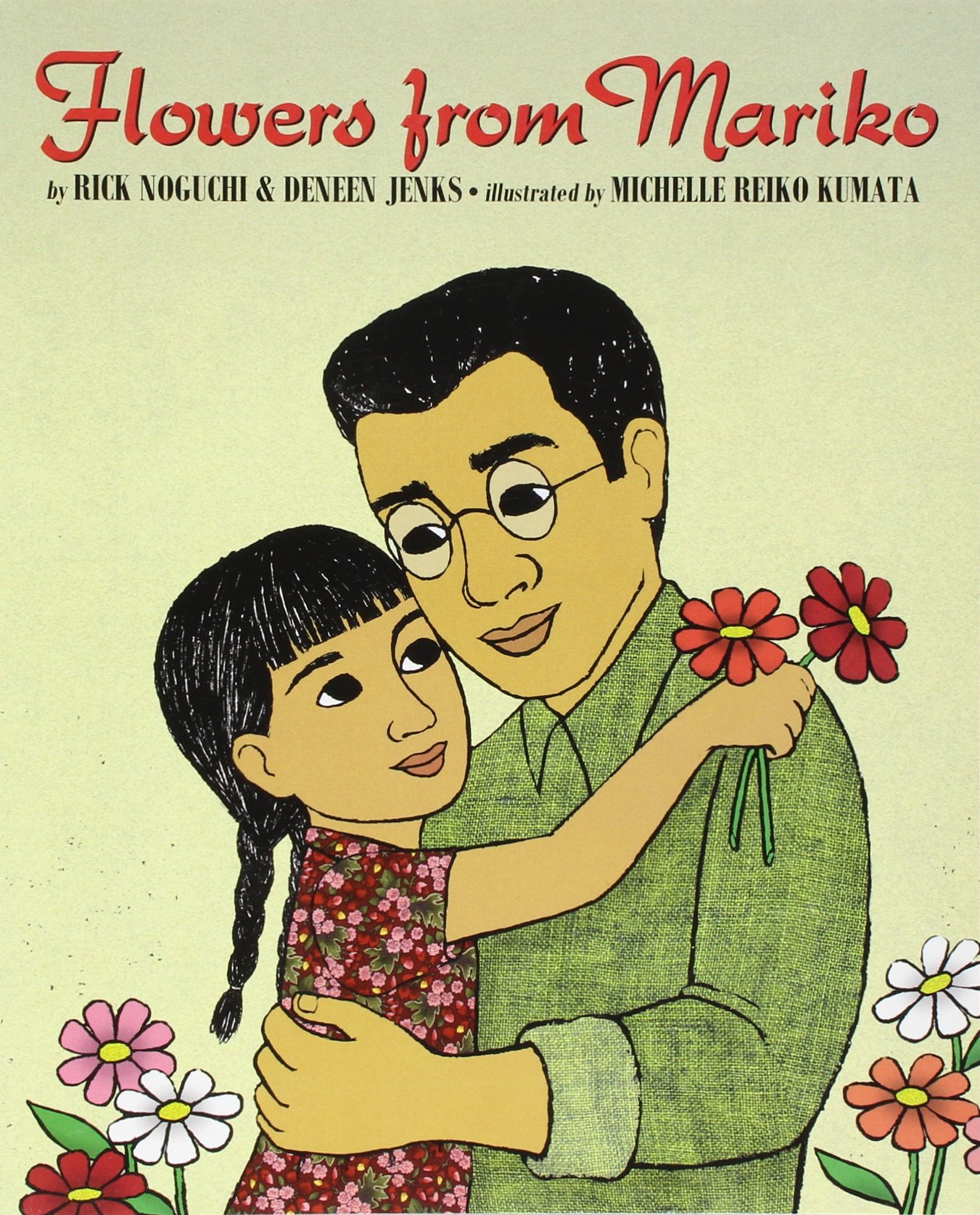Flowers from Mariko (book)
Creators: Rick Noguchi, Deneen Jenks, Michelle Reiko Kumata
Picture book for children about a Japanese American family's World War II incarceration and difficulties in restarting their lives after the war, told from the perspective of a young girl of about nine of ten. Mariko, her little sister Emi, and their parents live in Los Angeles before the war, where their father works as a gardener. When they are forced to leave, he leaves his gardening truck and equipment with their landlord. When Japanese Americans are allowed to return to the West Coast in 1945, the family makes plans to return. However their father finds that his truck and equipment have been sold, and the former landlord is nowhere to be found. The family is forced to live in a government-run trailer park upon their return, and her father is unable to find work. One day, he finds some old equipment in the trash, along with some flower seeds. Remembering the flower garden he had planted in the concentration camp (the particular camp is not specified), Mariko plants the seeds, hoping the flowers will cheer him up. The flowers eventually bloom, coinciding with her father finding the means to restart his gardening business. A one-page Author's Note provides a brief summary of the historical events from the roundup of Japanese Americans after Executive Order 9066 to Civil Liberties Act of 1988 .
Illustrator Michelle Reiko Kumata used ink and gouach resist to create black and white drawings that were then colored by computer. She scanned fabric and textured papers to create the patterns found primarily in the clothing of the characters. Flowers from Mariko was Kumata's first as an illustrator.
Authors Rick Noguchi and Deneen Jenks are a husband and wife team. Both hold MFA degrees in creative writing from Arizona State University. Flowers from Mariko was also the first children's book for each, though Noguchi had previously published two volumes of poetry ( The Wave He Caught [Pearl Editions, 1995] and The Ocean Inside Kenji Takezo [University of Pittsburgh Press, 1996]). Noguchi later became a program officer for the James Irvine Foundation and was named vice president of external affairs for the Japanese American National Museum in 2015.
Reviews for Flowers from Mariko were mixed. While Publishers Weekly cites the "strong imagery with apt metaphors," Elizabeth Bush in Bulletin of the Center for Children's Books cites the narration as "somewhat drawn out and bland," and Rosalyn Pierini in School Library Journal writes that the "poignancy of this family's ordeal and the tragedy of the forced removal during the war are dimmed somewhat by the flat tones of both the text and the illustrations." [1]
Footnotes
- ↑ Publishers Weekly , Oct. 22, 2001, 77; Elizabeth Bush, Bulletin of the Center for Children's Books 55.5 (Jan. 2002): 181; Rosalyn Pierini, School Library Journal , Nov. 2001, 130.
Find in the Digital Library of Japanese American Incarceration
This item has been made freely available in the Digital Library of Japanese American Incarceration , a collaborative project with Internet Archive .
Might also like:
Welcome Home Swallows
by Marlene Shigekawa;
So Far from the Sea
by Eve Bunting;
Heroes
by Ken Mochizuki
| Author | Rick Noguchi, Deneen Jenks |
|---|---|
| Illustrator | Michelle Reiko Kumata |
| Pages | 32 |
| Publication Date | 2001 |
For More Information
Publisher website: https://www.leeandlow.com/books/2392 .
Reviews
Andronik, Catherine. Booklist , Nov. 1, 2001, 484. ["Adults will need to explain the history before reading the story because the internment camp is simply called 'camp' in the text (an author's note at the back will help), and the illustrations are sometimes surprisingly racially ambiguous (the characters occasionally look more Latino than Japanese.)"]
Bush, Elizabeth. Bulletin of the Center for Children's Books 55.5 (Jan. 2002): 181. ["Noguchi's narration is somewhat drawn out and bland, and the family's renewed fortunes proceed with a steady pace more often found in picture books than in life."]
Pierini, Rosalyn. School Library Journal , Nov. 2001, 130. ["The poignancy of this family's ordeal and the tragedy of the forced removal during the war are dimmed somewhat by the flat tones of both the text and the illustrations. While the story is not unmoving, the static pictures and straightforward prose diminish the pathos inherent in these events."]
Publishers Weekly , Oct. 22, 2001, 76–77. ["The authors create strong imagery with apt metaphors."]
